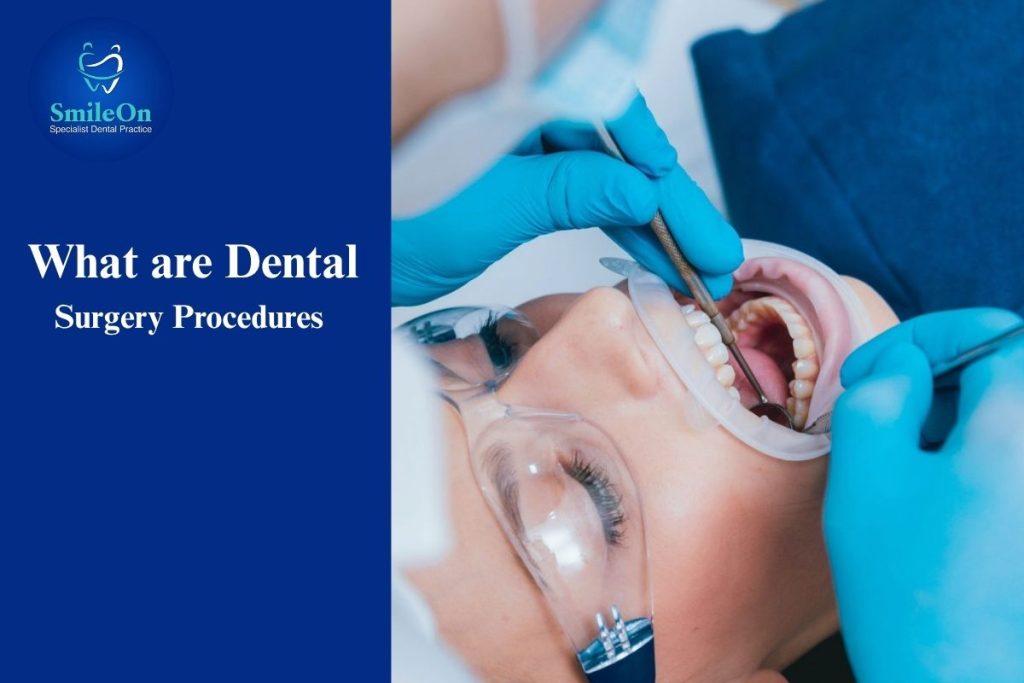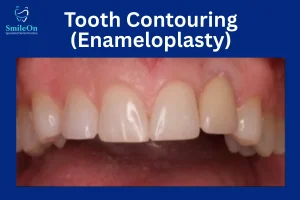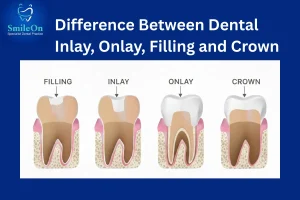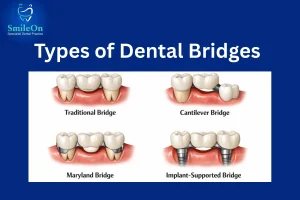Dental surgery might seem complex and challenging, but with modern technologies and skilled dentists, it can do wonders to improve your smile.
Whether you require a tooth extraction, an implant, or have jaw problems corrected, dental surgery can provide you with permanent solutions for health as well as cosmetic reasons.
In this guide, we’ll explain what dental surgery is and what treatments are considered to be in the category, as well as what you can expect during recovery.
Table of Contents
Toggle- What is Dental Surgery?
- Common Dental Surgery Procedures
- Conclusion
What is Dental Surgery?
Dental surgery involves a number of medical procedures that involve artificially modifying one’s teeth, gums or jaws in order to cure a problem that could not be treated with non-surgical treatment. These are performed by an oral surgeon or a dentist with special training.
It can be minor, such as the extraction of a simple tooth, or major, such as jaw reconstruction. The majority of surgeries are done under local or general anesthesia and pain free.
The American Dental Association (ADA) reports that more than 5 million dental surgeries are being done in the U.S. annually, proving the treatments to be safe and effective, proven by far too numerous samples of successful procedures!
Why Is Dental Surgery Needed?
Dental surgery isn’t all about looks, it’s also sometimes a critical part of preserving oral and overall health. You might require dental surgery if you have:
- Severe tooth decay or infection
- Impacted wisdom teeth
- Gum disease (periodontitis)
- Damaged or missing teeth
- Misaligned jaw or bite problems
- Oral cysts or tumours
For instance, if you have an infection in a tooth that has made its way to the root, a basic filling may not fit the bill. In those scenarios, the tooth can only be saved or complications avoided by way of a surgical procedure.
Common Dental Surgery Procedures
The following are some of the most popular dental surgery procedures, and what they entail:
Tooth Extraction:
It is also the most frequent of all oral surgeries. It is done on teeth that are too damaged to be candidates for repair. There are two main types:
- Easy to extract: When they have erupted enough for dental forceps.
- Tooth extraction/surgical: For broken teeth, or those impacted, like wisdom teeth!
Nonetheless, the third molar extraction is the most common surgical procedure in young adult patients.
Dental Implants:
Implants are used to replace missing teeth. The implant root is inserted into the jawbone and will be made of some titanium alloy. Following the healing period, an artificial tooth is attached to the implant.
The plus side is that implants are indistinguishable from a real tooth in look, feel and function; they can last in excess of 20 years with appropriate care. They’re ideal for patients who want a permanently fixed replacement to dentures or bridges.
Root Canal Surgery (Endodontic Surgery):
Surgery to remove the root canal is done when the pulp, which contains soft tissue within a tooth, gets infected. The surgeon removes the infected tissue, cleans out the canal, and seals it.
Occasionally, the tip of a tooth’s root can become infected following treatment, an apicoectomy is used to clean the end of the root and seal it. This gives the opportunity of saving natural teeth instead of removing them.
Gum Surgery (Periodontal Surgery):
It can be performed for combating gum diseases where the gums are inflamed or receded. Common gum surgeries include:
- Flap surgery: Bacteria are removed, and rough bone surfaces are smoothed.
- Gum grafts: Replace lost gum tissue and pause the loss of a tooth.
Healthy gums are just as important as healthy teeth.
Orthognathic (Jaw) Surgery:
Jaw surgery is an operation to set right the misalignment or other jaw defects of a person, which affects his/her ability to eat, speak and breathe. It too could aid in the quest for facial symmetry.
Patients who suffer from the most serious types of bite issues or those that are not treatable using orthodontics alone, tend to be ideal candidates for this technique.
Bone Grafting:
Bone grafts are used when there isn’t enough jawbone to support dental implants. Then the surgeon transplants new bone material, which promotes growth of the jawbone and a strong base for implants.
This is a common procedure in patients whose lost teeth and/or gum disease has led to bone loss.
Oral Pathology Surgery:
This may involve removing, diagnosing, and extracting growths, cystic masses, or other abnormal tissues that one finds in the mouth. It is vital for the protection against major oral health concerns and early signs of mouth cancer.
What to Expect Before Dental Surgery Process?
Your dentist will take these steps before the dental surgery:
- Perform X-rays or 3D scans of the problematic area.
- Start by reviewing your medical history and any medications you are currently taking.
- Explain to stutterers the procedure, what will happen to them during anesthesia, and how their parents can care for them afterwards.
- You will also be informed about the procedure, recovery time and projected costs.
Tip: Tell your dentist if you have conditions such as diabetes, heart disease or are pregnant, they may influence your treatment plan.
What Happens During the Procedure?
The majority of dental procedures are carried out in an office setting or in an outpatient environment. The process typically includes:
- Local anesthesia to numb the area or general anesthesia (for complicated cases).
- Surgically treating, if it’s the problem.
- Stitches or sutures, if needed.
- Monitoring, ensuring no immediate complications.
Quick procedures such as extractions may only take 20 – 30 minutes, whereas a dental implant or jaw surgery could span multiple appointments.
Recovery and Aftercare
Recovery time varies based on the type of surgery. Here’s what most patients can expect:
- Some redness or pain around the injection site for 2-3 days.
- Soft diet (soups, mashed potatoes, yogurt) for quicker recovery
- Soothing any pain with an over-the-counter or a prescribed medicine
- Do not smoke for at least 48 hours
- Recheck to monitor for healing
Patients typically resume normal activities in 3-7 days, depending on the type of procedure.
When Do You Need a Visit to the Dentist for Dental Surgery?
You should visit your dentist if you have:
- Persistent tooth pain or swelling
- Bleeding gums or loose teeth
- Difficulty chewing or jaw misalignment
- Broken or missing teeth
Early consultation can assist in managing potential dental problems before they develop into major problems that need surgery.
Conclusion
Dental surgeon procedures are nothing to be afraid of; they’re safe, effective, modern treatments that will let you get comfortable and confident again. From pulling teeth to having implants, all of it contributes to your oral health for the long run.
If you have dental pain or other oral concerns, talk to a dentist right away. The faster you act, the easier and quicker your recovery will be.






